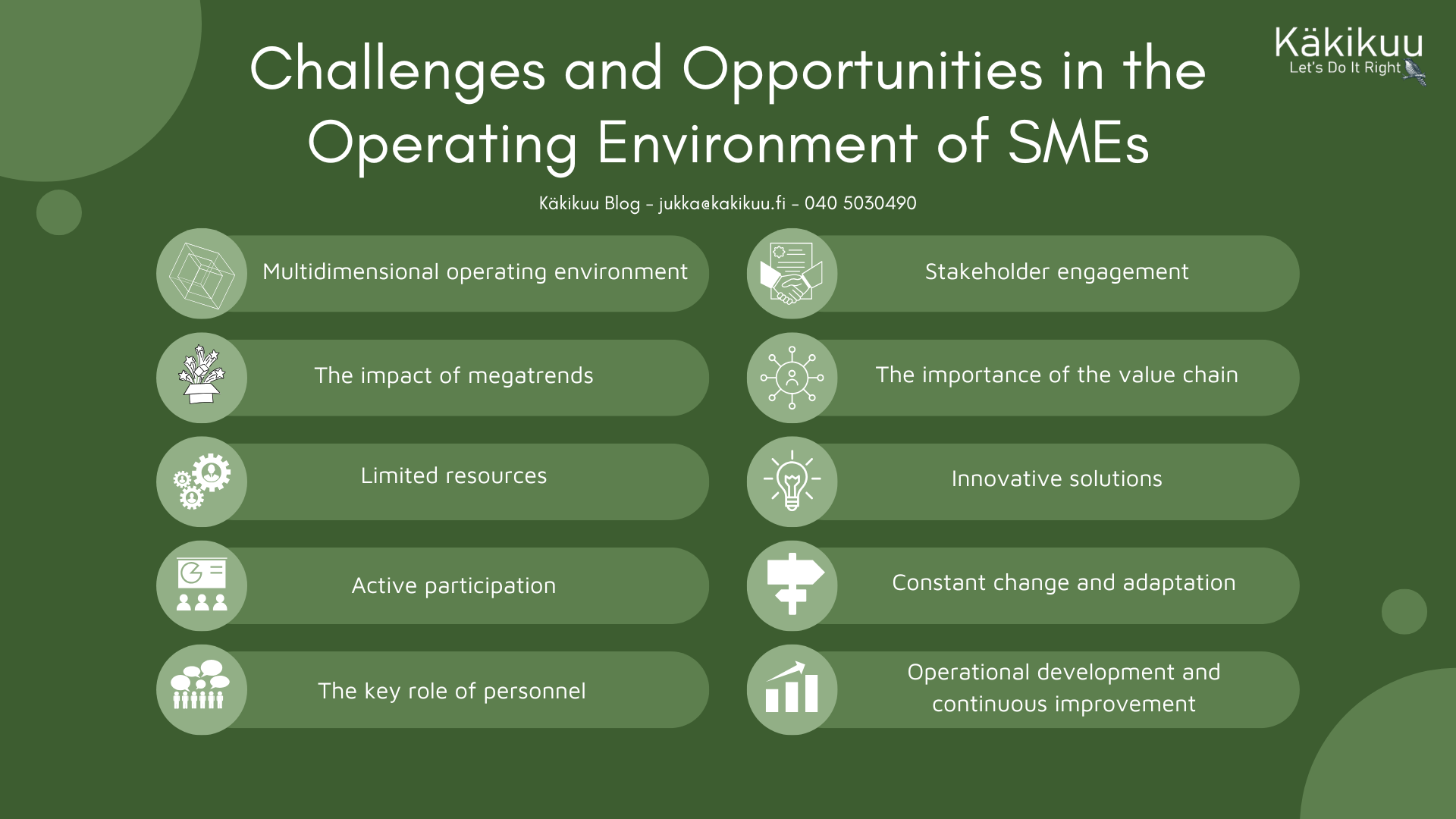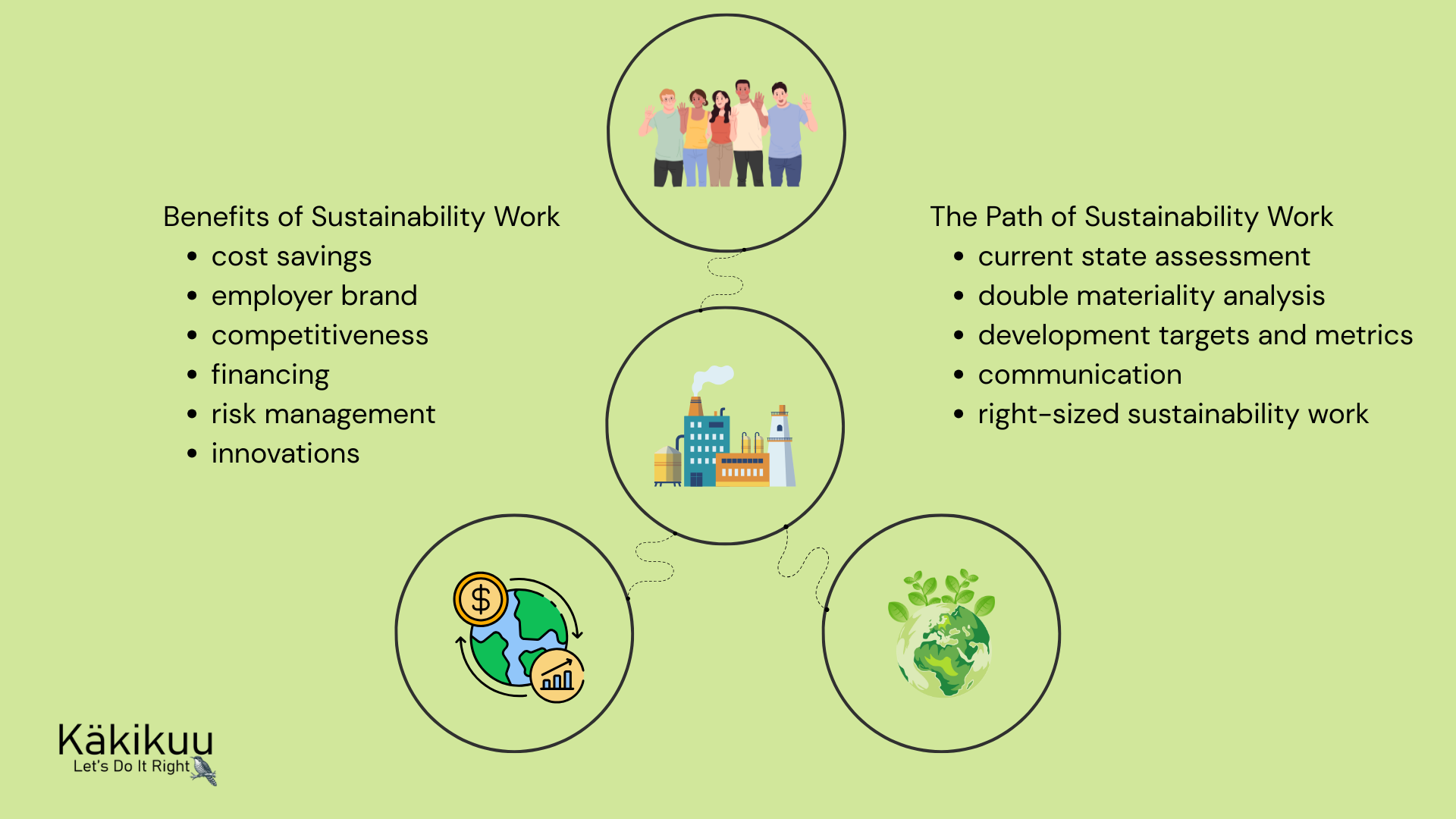The operating environment of small and medium-sized enterprises (SMEs) is shaped by many factors, such as personnel, customers, markets, competition, and legislation. Resources—practically time and money—often define the framework for business operations and development, especially in SMEs. Public discourse, along with the expectations of society and stakeholders, also play a role in shaping the operating environment for SMEs.
To succeed, a company must be an active participant, continuously interacting with its operating environment. It needs to understand the impacts and opportunities its operations create for people, the environment, and society—and, in turn, how these elements affect and create opportunities for the business. In practice, this means maintaining an open and active dialogue with stakeholders such as customers, employees, and partners. The company must be willing to listen, monitor its environment, learn, and respond to observed changes. This includes systematically collecting feedback and opinions, analyzing the data received, and using it to inform decision-making.
Megatrends such as climate change, digitalization, and the rise of the empowered individual indicate where the world is heading. These are long-term forces that broadly influence society—and business operations as well. Megatrends shape the operating environment of all companies, and it is essential for businesses to understand their significance and proactively adapt to them. For example, growing awareness of sustainability is changing consumer purchasing behavior. The adoption of digital solutions—such as customer relationship management systems or e-commerce platforms—can open new opportunities for using resources more efficiently and increasing revenue. It’s easy to see that the world is changing, but anticipating these changes and keeping pace with them requires companies to stay alert and actively engaged. It’s also important to recognize that these changes are not just threats—they often come with significant opportunities.
It’s easy to see that the world is changing, but anticipating these changes and keeping pace with them requires companies to stay alert and actively engaged.
Personnel play a central role in a company’s operating environment. Employee engagement and commitment are valuable assets that directly influence the quality of operations, the ability to engage in dialogue, the use of collected information and data, and the capacity to innovate. Quality of operations, data utilization, and innovation should not be limited to the agenda of top management alone—they must be embedded in the work and daily decision-making of every employee.
In small and medium-sized enterprises, a common concern is that developing operations requires resources. However, development work can actually be an effective way to use the company’s limited resources wisely and sustainably. Investing time and money in business development can improve productivity, reduce costs, attract customers, and increase revenue over the long term. For example, investing in energy efficiency can both reduce environmental impact and lower operating expenses.
A company’s value chains are an essential part of its operating environment, as the impacts of its activities extend beyond its own walls through the value chain. For example, the selection of suppliers and other partners, product lifecycle management, and customer education are all part of this environment. A company must understand that its decisions and actions can have wide-reaching effects across the entire value chain. At the same time, the value chain has a significant influence on the company itself and the success of its business.
Stakeholders play a significant role in the operating environment of small and medium-sized enterprises. Customers are not only a source of revenue but also providers of feedback, which can guide the company’s development—especially when that feedback is collected and utilized systematically. Employees are an internal asset, and their well-being and engagement directly influence the company’s success. Partners can offer opportunities for new practices and innovations, while societal expectations and regulations define the framework within which the company must operate.
Stakeholder engagement enables active and holistic business development—it is not limited to simply responding to received feedback. Dialogue with stakeholders helps a company understand what business development means from their perspective and what expectations they have for the company’s efforts. This approach helps identify potential bottlenecks and uncover innovative solutions that benefit all parties involved. Active stakeholder collaboration is also an important component of effective risk management.
Stakeholder engagement is an ongoing dialogue that fosters mutual respect and trust between parties.
Stakeholder engagement is an ongoing dialogue that fosters mutual respect and trust between parties. This interaction can also lead to new business opportunities, and involving employees in development efforts may reveal fresh perspectives and ideas. Open dialogue with partners can result in long-lasting partnerships and the creation of new, sustainable business models.
The success of small and medium-sized enterprises is built on their ability to adapt to a constantly evolving operating environment. This requires continuous development, effective use of data, innovation, and collaboration. Despite limited resources, it is essential to keep the company’s values and core business clearly in focus, actively monitor the operating environment, and be ready to adapt—and to proactively implement adaptive changes. Stakeholder engagement opens doors to new opportunities and helps companies build a functional operating environment that benefits all parties involved. SMEs must also be willing to adopt and utilize new technologies to support business development. By doing so, companies can not only cope with the challenges of their environment but also help shape it toward a better future. All of this represents both an opportunity and an investment—one that creates sustainable value both within the company and in its wider operating environment.



